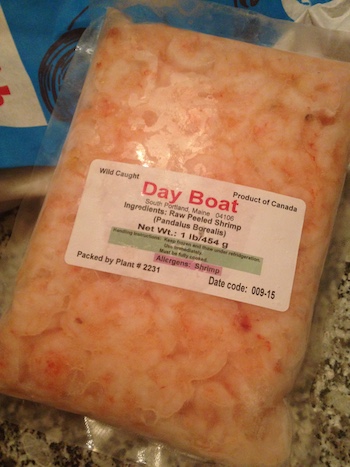The case for eating local seafood is an easy one to make: First, you know what you're getting is sustainably caught and healthy, and you get to support your local fishermen and the industry that relies on their productivity.
“Maine” shrimp from Canada. Melissa Wood photoSo what should the consumer do when a local fishery is shut down, like the New England northern shrimp closure, now in its second consecutive year? Consumers, like me, should switch to another local species, right? But what if I can find a similar version of the same product, caught from a nearby fishery that happens to be across an international border? What I’m trying to ask is, is it OK if I buy Canadian shrimp?
I found the Canadian pandalus borealis frozen by the pound at a great local seafood market, Coldwater Seafood, in Stonington, Maine. The shrimp is essentially the same product I would be buying if the Maine shrimp fishery were open, though for $12.99 a pound it's also more expensive. I’d rather buy Canadian shrimp than the frozen bags from Thailand, which is the only shrimp available at my local supermarket, but I realize that the shrimp I’m buying is still part of the overwhelming 91 percent of seafood in the U.S. marketplace that's imported.
Maine fishermen's loss has been a gain for our northern neighbors. The value of Canada's shrimp imports grew 20 percent 2013 to 2014, with imports of coldwater shrimp to Maine more than doubling to almost 100 metric tons, according to Canadian officials.
There actually was a small sample harvest of Maine shrimp earlier this year (shrimp caught during a survey that the fishermen were allowed to sell at auction), but that didn't stay in the local market. Unbelievably (to me at least), in one auction in February featured in a story about that harvest, of 1,200 pounds landed, 800 was bought for a Japanese buyer to sell to sushi restaurants.
Prices at that auction of around $4 per pound were higher than average because of the scarcity, but they may go right back down (the average is under $2) when the fishery comes back, according to an outbid New York buyer at that auction, because they've been absent for so long: “They’ll have to develop that market all over again.”
Gary Libby, of midcoast Maine’s Port Clyde Fresh Catch, predicted that Canadian shrimp may benefit Maine shrimpers because at least it will keep that product on their minds: “Once we get the resource back, we’re going to own it because we’re going to be able to deliver the product for less than Canada can,” he told the Portland Press Herald.
Ideally, the Maine shrimp fishery will come back and the price will stay high. So how do we make that happen?







